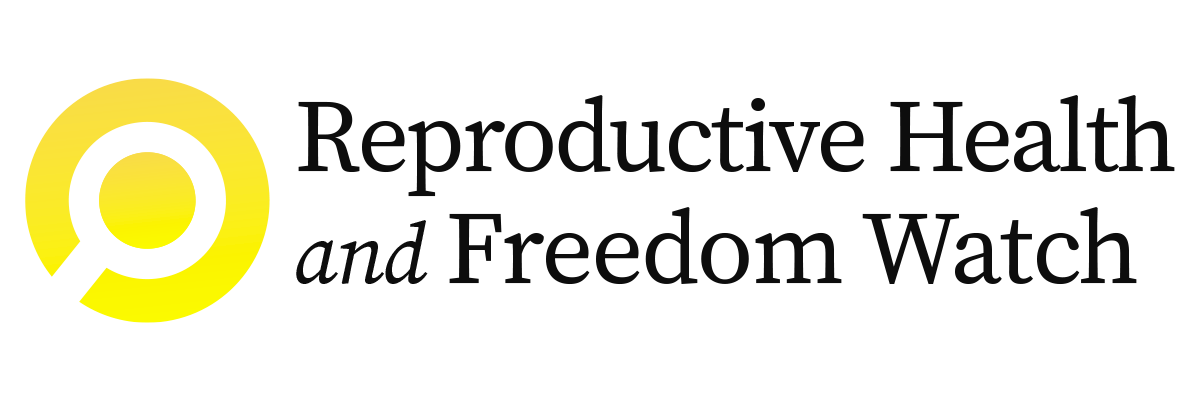Reproductive Health and Freedom Watch (RHFW) used Unregulated Pregnancy Clinic (UPC) (otherwise known as “crisis pregnancy center”, “pregnancy resource center”, or “anti-abortion center”) tax identification numbers (EINs) to identify revenue and expense data as reported on IRS Forms 990. To curate the list of UPCs in our dataset, we began with organizations provided by the ReproAction and #ExposeFakeClinics UPC databases and supplemented with basic search engine results. We used CauseIQ to identify organizations’ EIN numbers and then to pull associated Form 990 data. This directory does not represent all possible UPCs and only includes those UPCs for which we were able to find an EIN and Form 990.
Reproductive Health and Freedom Watch defines unregulated pregnancy clinics (UPCs) as non-profit organizations, primarily affiliated with national anti-abortion groups like Care Net, Heartbeat International, and NIFLA, that offer limited pregnancy-related information, counseling, and resources, and often claim to provide medical services such as pregnancy testing and ultrasounds. Since UPCs are not classified as medical practices and do not charge for their services, they are exempt from the regulations that govern medical clinics and commercial enterprises.
For this analysis and directory, RHFW considered an organization a UPC if it had at least one U.S.-based location and met at least one of the following criteria in two of the three categories:
Affiliation
- Member of a national UPC affiliation network (Birthright International, Care Net, Heartbeat International, NIFLA, or Birthright International)
- Member of a state “pregnancy care network” (such as Texas Pregnancy Care Network) in which membership is dependent on not providing or referring for abortion care
- Recipient of state “abortion alternatives” funding
- Appears on a consumer watch list (such as ReproAction’s Fake Clinic Database, Crisis Pregnancy Center Map, New River Abortion Access Fund) as a “fake clinic” “anti-abortion center” “crisis pregnancy center”
- Identifies as a “crisis pregnancy center” or “pregnancy resource center” in stated mission, 990, and/or incorporation documents
Services provided
- Counseling for: Abortion/Pre-abortion, Pregnancy, Parenting, Options, and/or “Post-abortion”
- Free pregnancy test
- Free ultrasound, “limited obstetric ultrasound”, or “non-diagnostic ultrasound”
- Pre-abortion consultation/screening
- Material goods/ “resources”
- “Abortion Pill Reversal” including promotion of the “Abortion Pill Reversal Hotline”
Service limitations
- Does not provide and/or refer for abortion care
- Does not provide and/or refer for emergency contraception (e.g. Plan B)
- Does not provide and/or refer for FDA-approved contraception
Challenges to analyzing UPC Financial Data
Compiling a comprehensive view of UPC finances is complicated by multiple factors, including inherent challenges within the IRS Form 990 process and additional complexities arising from the practices of unregulated pregnancy clinics themselves:
- Timeliness. There is a cumulative one- to two-year lag in the reporting and publishing of Form 990 data making it difficult to appreciate the full picture of UPC industry revenues/expenses in real time.
- Distinguishing UPCs. UPCs do not always disclose themselves as UPCs and have been permitted to operate in a regulatory grey zone for decades. Indeed, the IRS inconsistently codes UPCs with NTEE codes (national taxonomy of exempt entities, a taxonomy used by the IRS to categorize nonprofit organizations) ranging from R62 (Right to Life) to P40 (Family Services) or E40 (Reproductive Health Care Facilities). There is no standardized definition of UPCs, making it difficult to isolate these institutions.
- Frequent changes to identifying information. UPCs regularly change their names and addresses, making them difficult to track year-to-year. For the 2,207 UPCs for which we have been able to identify tax information, 769 (35%) report on their 990s at least one former or different “doing business as” name between 2018-2022.
- UPCs nested within larger institutions. Some UPCs are housed within larger institutions and their finances and activities are consolidated under and tied to the same EIN. For example, the “Foundations for Life Pregnancy Center” with four locations in Florida is part of the Catholic Charities of St. Petersburg. The connection between the UPC and Catholic Charities is noted on their “about us” section of the UPC website – “Please consider a gift to Catholic Charities. There are many ways to donate to the Center.” The Catholic Charities website also states the connection: “At the four Foundations of Life Pregnancy Centers and Knights Women’s Center run by Catholic Charities in the Diocese of St. Petersburg, these women encounter a loving and responsive team that is committed to helping them set and achieve goals and meet immediate needs.” Likewise, the Catholic Charities of the Archdiocese of Galveston Houston houses a UPC called Blessed Beginnings Life Center.
